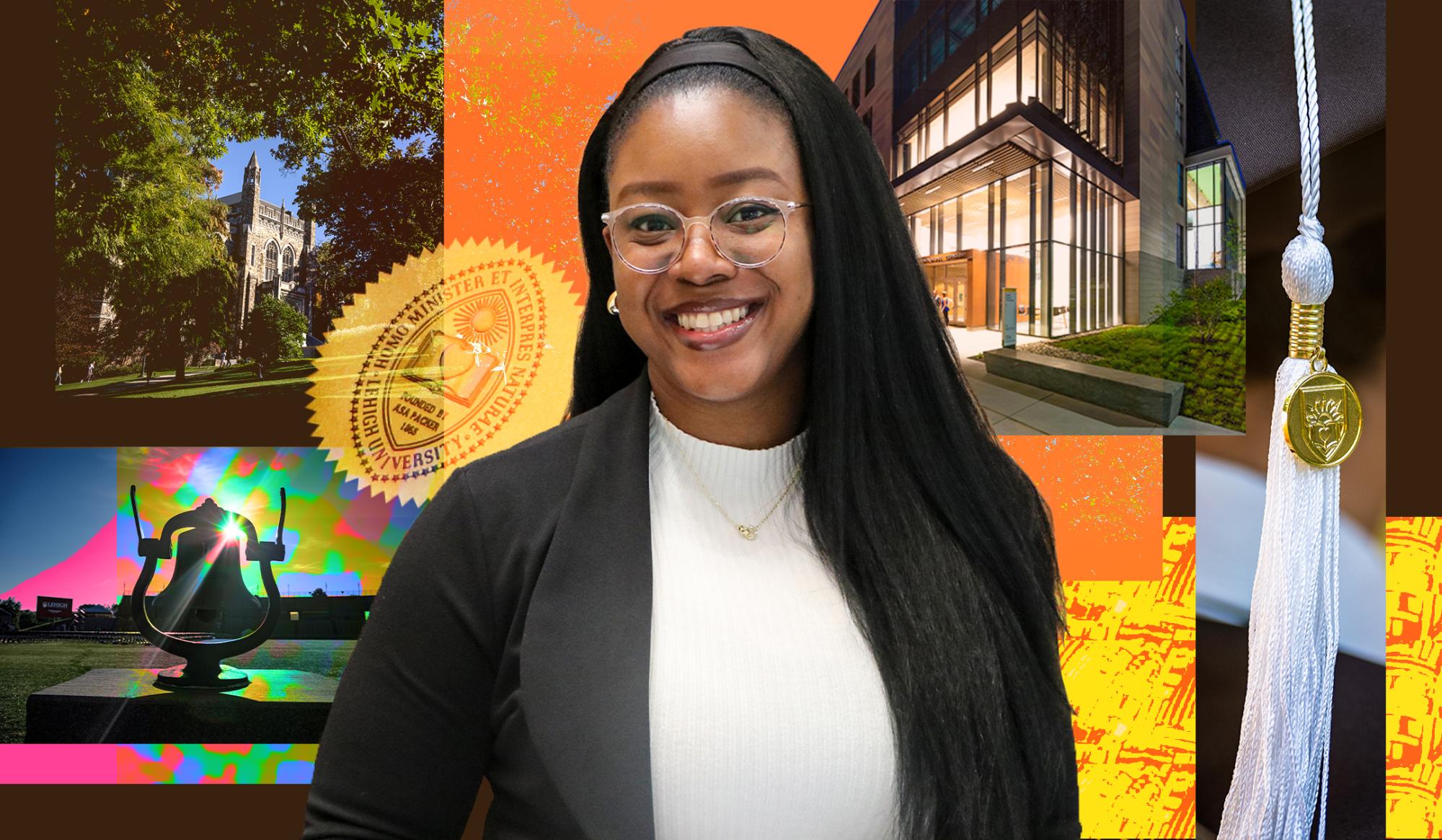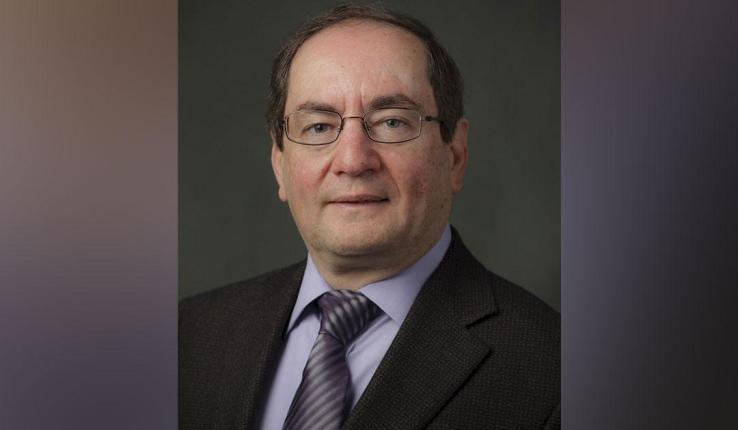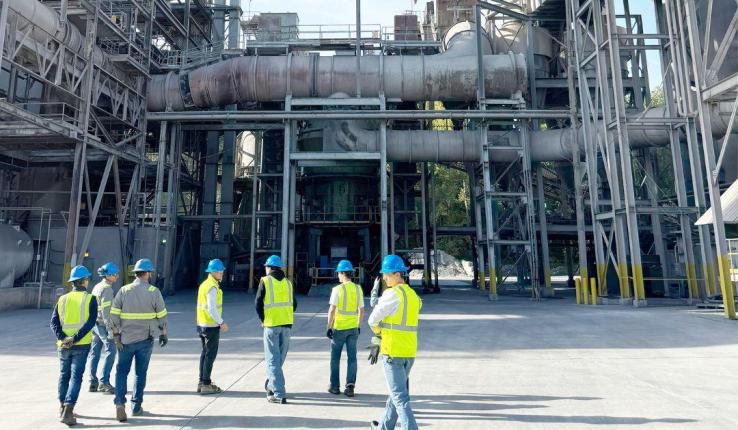Driven by a curiosity to understand the design of structures and how they support themselves, Urinrin Otite ’25G ’27 Ph.D. came to Lehigh in 2021 to earn her doctorate in civil engineering after graduating at the top of her class from Nigeria’s University of Port Harcourt.
As part of her Ph.D. research with Paolo Bocchini, professor of civil and environmental engineering and director of Lehigh’s Center for Catastrophe Modeling and Resilience, Otite realized she also has a passion for being able to build resilient infrastructure that can withstand hurricane-strength winds and other natural disasters.
In December, she became the first student to earn a master’s degree from Lehigh’s new catastrophe modeling and resilience program, which examines how disasters affect communities and how to mitigate those impacts. On May 17, she will be presented with her master’s during Lehigh’s Graduate Commencement and Doctoral Hooding Ceremony.
“I love this work. I love solving problems. I love trying to figure things out … I love the process of figuring things out,” Otite said.
When she came to Lehigh, Otite wasn’t familiar with catastrophe modeling. The West African nation of Nigeria is not directly in the path of the Atlantic hurricanes that are becoming increasingly common in the United States.
Otite took classes in catastrophe modeling for her Ph.D., and in her fourth year at Lehigh, was notified by Bocchini that she had earned enough credits for the master’s degree.
“I’m proud of this journey I’m on and I can’t wait for the great things that will happen in the future.”
Forging Her Path
Otite grew up comfortably in Delta, Nigeria, with two parents and three siblings. Things changed when Otite was 10 years old and her father, the family’s main provider, passed away.
His death forged a light in front of Otite, urging her to work harder, attend school and make her mother proud.
“We had to change our lifestyle, and in turn, I had to be more aware of what I need to do to be more independent,” Otite said.
Burying herself in her books, Otite studied civil engineering at the University of Port Harcourt, where she was one of only five women in her program of 50. This, she said, pushed her to work even harder to graduate first in her class and be the valedictorian of the faculty of engineering.
“I was always that person who would sit in the front row, ask questions and communicate with my colleagues and professors,” Otite said. “Because civil engineering is such a male-dominated field, I had to be conscious of how noticeable I would make myself.”
After graduating with her bachelor’s, Otite joined Arup, a multinational construction engineering company, as a graduate intern and then a graduate engineer in Lagos.
Otite was first introduced to the idea of coming to the U.S. for higher education through Arup, since it has offices in New York City. Her time at Arup gave her real-world research experience that helped prepare her for pursuing a doctorate at Lehigh, Otite said.
Why Lehigh?
Otite knew advanced educational opportunities, specifically research and testing, would bring her to the U.S.
Otite used Education USA Opportunity Funds Program, a Department of State network of more than 430 international student advising centers in more than 175 countries and territories, to help her secure funding, sponsorships and visas to study in the U.S.
Through this program, Otite earned admission to Lehigh, Stanford University, Johns Hopkins University, the University of California, Berkeley and others.
However, Lehigh was an easy choice, she said.
“With my other applications, they were just other applications. Lehigh was different,” Otite said.
Lehigh was the only university where she was connected to her supervisor personally during the application process, and he invited her to join the team’s weekly meeting, Otite said.
“I already felt like I was a student here, even though I wasn't physically present,” Otite said. “I understood the culture here, how the students related to [Bocchini] and how he spoke to the students. I told myself, ‘This is the person that I want to work with.’”
Now her advisor for the past four years, Bocchini knows that Otite has taken full advantage of what she’s been given.
Bocchini meets with every prospective Ph.D. student, but said he knew Otite would be coming to a very different academic environment than what she was used to. He knew she would have to work harder than some, and she met the challenge.
“I noticed that Urinrin is a go-getter, and I was convinced that she would take the maximum advantage of this opportunity, if offered to her,” Bocchini said. “I think this is one of the most important qualities for prospective students, and I decided to bet on her. In these years, she confirmed that my hunch was correct.”
Otite will be attending her first academic conference with Bocchini in California this summer, the Engineering Mechanics Institute (EMI) Conference, where she will present her research on “Multidimensional Wind Fragility Curve Generation for Steel Transmission Monopoles.” Otite said she is nervous but excited to hear feedback on her ongoing research, but will use it as an opportunity to hear from her peers on how she can improve.
“I cannot even emphasize this enough, but [Bocchini] invested a lot of time in me, and he’s guided me and mentored me. He saw that I was on the right track,” Otite said.
Her Current Research and Curriculum
The Center for Catastrophe Modeling and Resilience aims to explore how hurricanes, pandemics and other large-scale events impact communities. Last year, it was announced as one of Lehigh’s University Research Centers, created to address critical needs in society and position Lehigh researchers as international experts in their fields.
Disasters force researchers to closely examine the resilience of current infrastructure and how to build communities that can withstand these disasters and more quickly rebuild.
“When you understand how they respond, you also know how to better design them to be more resilient to these natural hazards,” Otite said.
Otite is focusing on steel transmission monopoles and how they respond to hurricane winds.
These monopoles are single, self-supporting vertical poles or towers used to support power transmission lines. They are extremely vulnerable to collapse, especially during a hurricane.
Otite is developing fragility curves to tell the probability of failure of a structure over a range of wind speeds during a storm. She is also trying to generate speedy recovery models for them.
“Losing power is really dangerous. A lot of things can go wrong,” Otite said. “Engineers and researchers are constantly trying to reduce that downtime to a minimum and also speed up recovery for the structures.”
To produce tangible results in her own research, Otite took catastrophe modeling and resilience courses to study how the built environment responds to disasters.
After her expected graduation in 2027, Otite wants to join a team that addresses these problems firsthand and continues to reduce the impact of natural disasters.
Building Community
Otite admits she struggles with hitting walls in her work, and sometimes the light from her father in front of her fades. However, her family is the reason she perseveres.
“It can be really tough, but I remember why I decided to come here. I decided to embark on this journey. My mom is my role model, and she didn't give up either. She didn’t give up on her job, her dreams or her kids. So when it gets tough, I tell myself: ‘You can do it. You can do it for yourself. You can do it for your family. They're rooting for you.’”
Being from such a faraway place, Otite said, challenged her to find and build a community at Lehigh.
A fellow graduate student, Nancy Oloyede ’24 Ph.D., noticed a small but growing number of Nigerian graduate students at Lehigh and founded The Nigerian Club with Otite as vice president, where they build community, support one another and better represent Nigerian graduate students.
Now, as club president, Otite attends Graduate Student Senate meetings every other week, handles events and acts as the point of contact for other organizations wanting to reach Nigerian students.
Otite said her presidency has played a fundamental role in her journey to finding community and has been a rewarding challenge.
Her professors and advisors are with her on her journey too, she said.
Otite recognizes she’s taken so many risks to accomplish what she has, and sometimes she gets lost in her work. Her family is what keeps her afloat and reminds her that she should be proud of her accomplishments.
“When I told my family about the master’s, they acted like I won a Nobel Prize,” Otite said. “They were over the moon. When I got the degree, I moved on with my work. But for them, it was a huge win. So I paused and thought, ‘I should be as happy as they are.’”
Although her family does not plan to come to Lehigh for her commencement, her husband and friends will cheer her on from the stands as she receives her degree.
Otite reminds herself that she left her country for her degree, which was a major step forward. She couldn’t be prouder of her decision to come to Lehigh.
Now, she hopes to inspire young Nigerian girls to take risks like her to accomplish their dreams.
“I wish a young Nigerian girl will see this: don’t let the world diminish you. Don’t let the world tell you who you are supposed to be. When you are successful and when you achieve your dreams, that same world that told you to shrink yourself will celebrate you. They will be proud of you and sing your praises.”
Story by Sydney Weaver ’25
Lehigh has been named an R1 research university by the Carnegie Classification of Institutions of Higher Education. Universities with this designation conduct the highest level of research activity within the Carnegie Classification. Lehigh is the only university in the Lehigh Valley to have this designation, and one of seven in Pennsylvania. Learn more.





